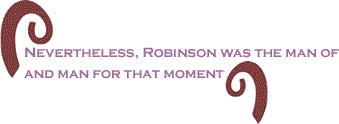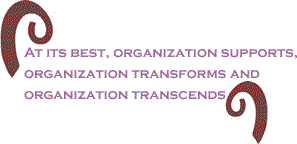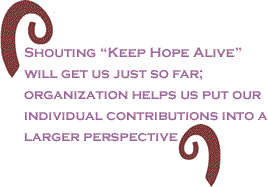
|
|||||||||||||||||||||
|
The current issue is always free to all readers If
you need the access available to a |
|
 |
|
The recent commemorations of Jackie Robinson’s 1947 entrance into Major League Baseball have brought attention to what has and has not transpired on the ball field, as well as in the USA over the last 60 years. Much of this attention deservedly went to Jackie Robinson-the-man, and the courage that he exhibited in his protracted struggle to desegregate the then (and for some us today’s), most important sport in the United States. Yet, in watching old news clips, I found myself looking behind the story and thinking about the increased bitterness that took hold of Robinson as the years went by. I could not help but wonder about the extent to which that bitterness was connected to and influenced the physical ailments from which he suffered and which, eventually, ended his life. Robinson knew that there were African American players better than he who had never had the chance to play Major League Baseball, or, due to their age, would never have a reasonable opportunity to excel. Robinson, as most sports enthusiasts and lovers of history know, was compelled to keep his mouth shut while playing ball in the face of countless racist provocations. That was part of the deal he had with Branch Rickey, despite the personal toll it took on him. Nevertheless, Robinson was the man of and man for that moment. Robinson, of course, went on to be a major figure in the Civil Rights movement and an outspoken opponent of white supremacy in the broader US society. Inspiring the younger St. Louis Cardinals player Curt Flood, he appeared at Curt Flood’s trial in support of Flood’s challenge to the “reserve clause” which condemned most players to virtual indentured servitude. Like too many other courageous figures, Robinson became an icon and was not expected to show and possess any weaknesses. Held in esteem, many of those who claimed to respect and cherish his legacy were not prepared to emulate either his actions or his courage. That is, there was gratitude and support for his taking the stands that he took, but this did not necessarily translate into replicating his practice.
As the years progressed, Robinson’s bitterness began to show. His bitterness with the baseball establishment was most evident, as represented by one of his final speeches in which he reminded the baseball world of the need for Black managers. But I would guess that the bitterness that emerged also corresponded to the weakening of the larger movement for social change in the USA and the question that he, and many other heroes and heroines like him - within baseball, certainly Curt Flood - grappled with over time: were there others to take up where they left off? In looking at the photos of Jackie Robinson and viewing the news clips, I found myself, quite ironically, thinking about questions of organization, particularly activist organization in the service of social justice. I have known other “Jackie Robinsons.” If I mentioned their names in this essay, you would have no idea about whom I was speaking, because they are the nameless heroes and heroines out there engaged in the often thankless struggle for social justice. I have watched many of them unravel over time, influenced by substance abuse, mental or emotional difficulties, economic stress, or just the problems of everyday living. Some of them have also devolved into bitterness. In all too many cases, they have felt that they have had to do battle with social injustice from within a peculiar sort of cocoon. In other words, they believed that they had to be the champion(s) of the struggle, but could not turn to anyone else with whom they could share their private thoughts, fears and concerns, out of a sense that this would somehow be letting "everyone" down. As a result, they burn out, shut down, and melt away like a piece of film stuck in a projector. As odd as it may sound, Jackie Robinson, and the thousands of “Jackie Robinsons” engaged in the struggle for social justice (not to mention those engaged in the struggle for social transformation) needed and continue to need organization. While history will remember, to varying degrees, the heroism of Jackie Robinson, Curt Flood, et. al., the reality is that the movement needs to be able to replicate these individuals. No, not cloning, but replicating the commitment, courage and insight. That does not happen by accident or through magic, but through organization. At its best, organization supports, organization transforms and organization transcends.
Bitterness comes not simply or mainly from frustration or even
setbacks. It comes, largely, through a sense of isolation, and
thus, a loss of hope.
In
our struggle we must expect setbacks and defeats. But we cannot concede the
ground to despair and bitterness. Shouting “Keep Hope Alive” will
get us just so far; organization helps us put our individual contributions
into a larger perspective. BC Editorial Board member Bill Fletcher, Jr. is a long-time labor and international activist and writer. He is the immediate past president of TransAfrica Forum. Click here to contact Mr. Fletcher. |
|
| Home | |
| May
17, 2007 Issue 230 |
||||||||||||||
|
||||||||||||||
| Printer Friendly Version in resizeable plain text format | ||||||||||||||
|
|
||||||||||||||
 |
||||||||||||||
 |
||||||||||||||
 |
||||||||||||||
| |
||||||||||||||
| |
||||||||||||||



































